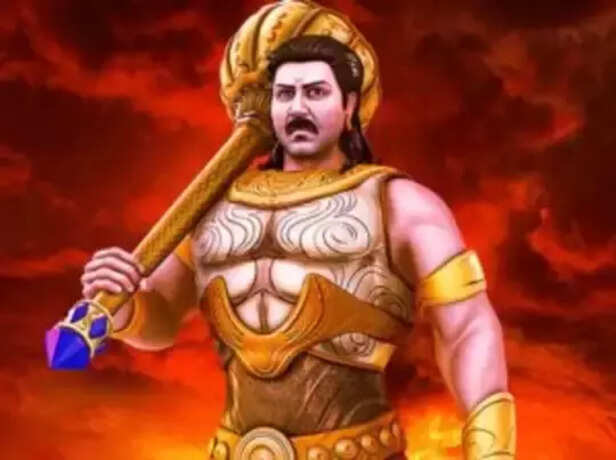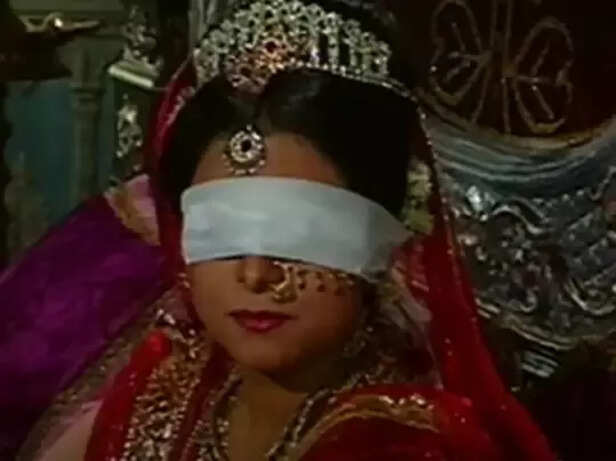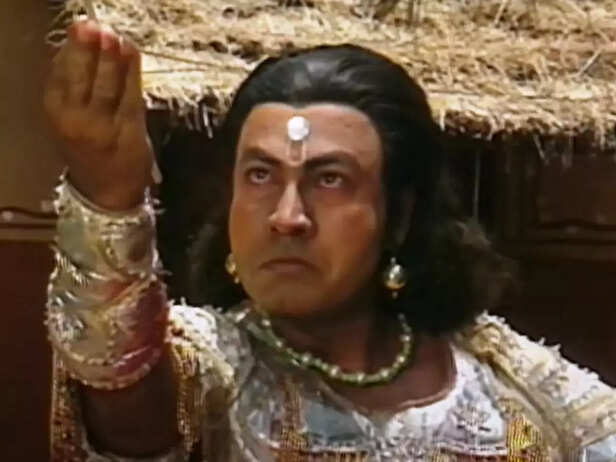Who Was the Most Cursed Person in the Mahabharata?
Riya Kumari | Mar 19, 2025, 23:59 IST
So, let’s talk about the real MVPs of the Mahabharata. No, not Krishna, not Arjuna, not even Draupadi. I’m talking about the cursed ones—the ones who took one wrong turn (or, honestly, were just minding their own business) and ended up saddled with celestial-level bad luck. And believe me, if the Mahabharata teaches us anything, it’s that karma is punctual, fate has a twisted sense of humor, and ancient India had an extreme lack of therapy.
The Mahabharata is not just a story—it is a mirror. A mirror that reflects human flaws, karmic debts, and the relentless cycle of cause and effect. It is not a tale of heroes and villains, but of choices and consequences, of intentions and the burdens they leave behind. And within this vast epic, some souls carried curses so heavy that even time could not erase their suffering. But who was the most cursed of them all? This is not an easy question to answer, because every curse in the Mahabharata was not just a punishment—it was a lesson. And if we listen closely, we might hear whispers of those lessons in our own lives.
1. Karna: The Man Who Was Never Allowed to Win

Karna’s story is not just about misfortune; it is about rejection, about the relentless struggle of a man who was never allowed to belong. He was born with divine armor, yet abandoned at birth. He was blessed with skill, yet denied recognition. He was noble in spirit, yet forced to stand on the wrong side of history. And the curses? They came like unseen shackles, waiting to drag him down at the moment he most needed to rise.
His teacher cursed him that he would forget his knowledge when he needed it most—an eerie echo of how life sometimes takes away the very things we rely on when we need them most. A grieving Brahmin cursed him that his chariot would fail him—a reminder that fate does not forget the small injustices we commit, even when they seem insignificant. His own generosity cursed him, as he gave away his divine armor and earrings, leaving himself vulnerable—proof that sometimes, even virtue can cost us everything.
Karna’s life was not just cursed; it was designed to teach us the pain of longing for a place in a world that refuses to accept us. And in that, how many of us see our own struggles?
2. Gandhari: The Curse of a Mother's Grief

Gandhari was not just cursed—she became the curse. Her suffering was not a singular moment of bad luck. It was the slow, suffocating pain of watching everything she loved be destroyed, despite knowing it was inevitable. A mother who bore a hundred sons, only to witness every single one of them fall in battle. A woman who blindfolded herself in loyalty to her husband, only to see (ironically, more clearly than anyone else) the destruction that lay ahead.
Her curse was not one placed upon her—it was the one she gave. And it was not spoken in anger, but in unbearable sorrow. She cursed Krishna, the divine orchestrator of the war, that his own Yadava clan would destroy itself in the same way her family had. And in the end, that is exactly what happened. Because when pain becomes unbearable, it does not fade—it spreads. How often do we see this in our own lives? When our suffering spills onto others? When our wounds create wounds in those we love?
3. Ashwatthama: The Curse That Never Ends

If Karna's curse was to be denied victory, and Gandhari’s was to watch destruction unfold, then Ashwatthama’s curse was to never find peace. In the dead of night, he slaughtered innocent children, mistaking cruelty for justice. And in return, Krishna cursed him with something worse than death: His wounds would never heal, festering for eternity. He would wander, alone and rejected, for the rest of time. He would never find release, no matter how much he longed for it.
Ashwatthama’s curse is the most terrifying of all—not because it is dramatic, but because it is unending. His punishment is not death, but existence itself. And isn’t that the worst suffering of all? To exist in regret, unable to undo what has been done?
The True Meaning of a Curse
A curse in the Mahabharata is not just about divine punishment. It is a chain—one that binds a person to the consequences of their choices. But here’s the part we often forget: every curse in this epic was earned. Not always through cruelty, but through action. Through choices that seemed small at the time, but grew into something inescapable. And isn’t that how life works?
How often do we carry burdens from our past, unable to shake them off? How often do we find that a single mistake ripples through years of our lives? How often do we see that even the most well-intended actions can have unintended consequences? The Mahabharata does not tell us to fear curses. It tells us to understand them. Because at the heart of every curse is the same message: Be aware. Be accountable. Be careful with what you set into motion. So, who was the most cursed? Perhaps the real answer is this: the one who did not understand their own fate until it was too late.
1. Karna: The Man Who Was Never Allowed to Win

Karna
( Image credit : Times Life Bureau )
Karna’s story is not just about misfortune; it is about rejection, about the relentless struggle of a man who was never allowed to belong. He was born with divine armor, yet abandoned at birth. He was blessed with skill, yet denied recognition. He was noble in spirit, yet forced to stand on the wrong side of history. And the curses? They came like unseen shackles, waiting to drag him down at the moment he most needed to rise.
His teacher cursed him that he would forget his knowledge when he needed it most—an eerie echo of how life sometimes takes away the very things we rely on when we need them most. A grieving Brahmin cursed him that his chariot would fail him—a reminder that fate does not forget the small injustices we commit, even when they seem insignificant. His own generosity cursed him, as he gave away his divine armor and earrings, leaving himself vulnerable—proof that sometimes, even virtue can cost us everything.
Karna’s life was not just cursed; it was designed to teach us the pain of longing for a place in a world that refuses to accept us. And in that, how many of us see our own struggles?
2. Gandhari: The Curse of a Mother's Grief

Gandhari
( Image credit : Times Life Bureau )
Gandhari was not just cursed—she became the curse. Her suffering was not a singular moment of bad luck. It was the slow, suffocating pain of watching everything she loved be destroyed, despite knowing it was inevitable. A mother who bore a hundred sons, only to witness every single one of them fall in battle. A woman who blindfolded herself in loyalty to her husband, only to see (ironically, more clearly than anyone else) the destruction that lay ahead.
Her curse was not one placed upon her—it was the one she gave. And it was not spoken in anger, but in unbearable sorrow. She cursed Krishna, the divine orchestrator of the war, that his own Yadava clan would destroy itself in the same way her family had. And in the end, that is exactly what happened. Because when pain becomes unbearable, it does not fade—it spreads. How often do we see this in our own lives? When our suffering spills onto others? When our wounds create wounds in those we love?
3. Ashwatthama: The Curse That Never Ends

Ashwathama
( Image credit : Times Life Bureau )
If Karna's curse was to be denied victory, and Gandhari’s was to watch destruction unfold, then Ashwatthama’s curse was to never find peace. In the dead of night, he slaughtered innocent children, mistaking cruelty for justice. And in return, Krishna cursed him with something worse than death: His wounds would never heal, festering for eternity. He would wander, alone and rejected, for the rest of time. He would never find release, no matter how much he longed for it.
Ashwatthama’s curse is the most terrifying of all—not because it is dramatic, but because it is unending. His punishment is not death, but existence itself. And isn’t that the worst suffering of all? To exist in regret, unable to undo what has been done?
The True Meaning of a Curse
How often do we carry burdens from our past, unable to shake them off? How often do we find that a single mistake ripples through years of our lives? How often do we see that even the most well-intended actions can have unintended consequences? The Mahabharata does not tell us to fear curses. It tells us to understand them. Because at the heart of every curse is the same message: Be aware. Be accountable. Be careful with what you set into motion. So, who was the most cursed? Perhaps the real answer is this: the one who did not understand their own fate until it was too late.
